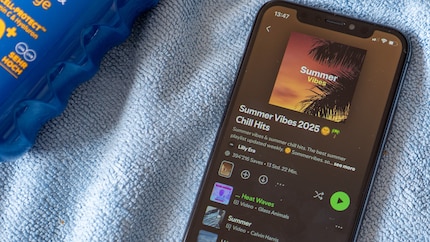Smartphone use
What are the rules on phone use at your local outdoor pool?
- Photos and videos are prohibited.36%
- There isn’t an all-out ban in place.28%
- I don't know.35%
The competition has ended.

When summer rolls around, smartphones are as ubiquitous at outdoor swimming pools as sunscreen and ice cream. Being surrounded by cameras sometimes feels disconcerting. And if parents’ phones distract them from supervising their kids, things can quickly take a dangerous turn.
If you’ve spent any time careering down frog slides, splashing through water fountains or dunking plastic buckets in recent years, you’ll relate to the situation I’m about to describe. Kiddie pool visitors can be split into two camps. In one camp, you’ve got the parents who hold their little one’s hand and follow their every move. In the other, you’ve got the ones who sit slightly further away from the action, paying just as much attention to their phones as to the pool.
If they ever do approach the water’s edge, it’s to take photos or videos of their kid. This isn’t just a problem for bathers who feel as though their privacy’s being disrespected. It also spells trouble for lifeguards who get dragged in to mediate awkward discussions when things get hairy (article in German).
This creates additional stress for poolside staff, distracting them from their most crucial job: ensuring the safety of everyone at the pool. Even if it weren’t for the all-consuming presence of smartphones, lifeguards would have enough on their plates. After all, adults still drastically underestimate the risks children face in water. In fact, only eight per cent of men and 22 per cent of women are aware that small children can drown silently and quickly, even in just a few centimetres of water (article in German). A child just has to lose their footing once to get into a life-threatening situation.
«A small child’s heavy head naturally pulls them forward and downwards», writes the Swiss Life Saving Association SLRG on its website (in German). The organisation also cites smartphones as the main source of potential danger at a pool: «Always keep your child under supervision and don’t allow yourself to be distracted by your smartphone or conversations.» Since drowning is still the second most common cause of accidental death among children, it’s crucial we keep repeating this apparently obvious truth like a mantra.

As smartphones and mobile internet have become part of everyday life, the number of accidents generally involving children has increased. Unlike on playgrounds, it’s easier to recognise the link between phone use and safety incidents in water. When lifeguards or other bathers are forced to intervene to rescue small children, it’s not uncommon for their parents to be found nearby, engrossed in their phones.
«Because of mobile phones, we’re now making more rescues than we used to,» says Michael Kunz, the now Honorary President of the «Schweizerischer Badmeister-Verband» (Swiss Association of Pool Masters) in an interview with newspaper «Der Bund» (in German). Despite calls for an all-out ban on smartphones at outdoor pools, no such ban has been put in place. Rules surrounding phone use vary from pool to pool and are often vaguely formulated and difficult to enforce.
Let’s have a look at two examples (both links in German). While the regulations on municipal swimming pools in Bern don’t mention mobile phones, they do say: «Bathers and other users of these facilities must show consideration towards each other and refrain from doing anything that may cause a nuisance to other guests or endanger themselves or others.»
Meanwhile, the rules governing bathing facilities in Zurich explicitly state: «Taking photos and videos is prohibited. However, you may take photos of sunsets as long as they don’t include people you don’t know.» Both approaches demonstrate how difficult it is to enforce the rules and how much staff have to rely on their intuition.
What are the rules on phone use at your local outdoor pool?
The competition has ended.
Whether it’s taking a quick snap for the grandparents, being reachable via WhatsApp or paying for fries at the kiosk, smartphones are now a well-established part of everyday life. Not to mention the fact they’ve been waterproof for a while now. However, this doesn’t make things much easier for lifeguards. How are just a few members of staff supposed to watch what people are doing with their devices amid all the hustle and bustle of a pool? Most of the time, all they can do is appeal to bathers’ common sense. In its poster campaign, the «Verband Hallen- und Freibäder» (Association of Indoor and Outdoor Pools) also focuses on personal responsibility (website in German).

Taking toddlers to the pool can be so exhausting that parents are delighted when their little ones finally get out of the risky phase. However, parents of children who’ve just learned to swim often overestimate their child’s abilities and lull themselves into a false sense of security. Even buoyancy aids only make a child safer to a limited extent. At the end of the day, parents are responsible for their children – even if some seem to think they hand over that responsibility at the entrance to the pool.
Although the kiddie pool no longer plays a major role in my life, a few sticky situations have stuck with me. Memories of small children lying face down in shallow water for a brief, yet long moment. Or kids jumping into the deep end, beaming and fearless, only to be dragged back to the surface by strangers. Fortunately, plenty of bathers still keep their wits about them where dangerous situations might occur. When taking young children to a pool, they leave their phones, books and magazines where they belong: in their bags.
What do you notice when you go to an outdoor pool? Does the presence of phones bother you? Have you had any unpleasant experiences? What do you think of the work carried out by lifeguards? Let me know in the comments.
Simple writer and dad of two who likes to be on the move, wading through everyday family life. Juggling several balls, I'll occasionally drop one. It could be a ball, or a remark. Or both.
Interesting facts about products, behind-the-scenes looks at manufacturers and deep-dives on interesting people.
Show all